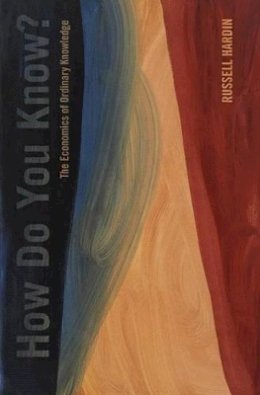
Stock image for illustration purposes only - book cover, edition or condition may vary.
How Do You Know?: The Economics of Ordinary Knowledge
Russell Hardin
€ 87.87
FREE Delivery in Ireland
Description for How Do You Know?: The Economics of Ordinary Knowledge
Hardback. Supposes that people are not usually act knowingly against their interests or other purposes. This title presents an economic account of what an individual can come to know and applies this account to many areas of ordinary life: political participation, religious beliefs, popular knowledge of science, liberalism, extremism, and moral beliefs. Num Pages: 256 pages. BIC Classification: HPK; HPS; JFC. Category: (P) Professional & Vocational; (U) Tertiary Education (US: College). Dimension: 229 x 152 x 23. Weight in Grams: 472.
How do ordinary people come to know or believe what they do? We need an account of this process to help explain why people act as they do. You might think I am acting irrationally--against my interest or my purpose--until you realize that what you know and what I know differ significantly. My actions, given my knowledge, might make eminently good sense. Of course, this pushes our problem back one stage to assess why someone knows or believes what they do. That is the focus of this book. Russell Hardin supposes that people are not usually going to act knowingly against their interests or other purposes. To try to understand how they have come to their knowledge or beliefs is therefore to be charitable in assessing their rationality. Hardin insists on such a charitable stance in the effort to understand others and their sometimes objectively perverse actions. Hardin presents an essentially economic account of what an individual can come to know and then applies this account to many areas of ordinary life: political participation, religious beliefs, popular knowledge of science, liberalism, culture, extremism, moral beliefs, and institutional knowledge. All of these can be enlightened by the supposition that people are attempting reasonable actions under the severe constraints of acquiring better knowledge when they face demands that far outstretch their possibilities.
Product Details
Format
Hardback
Publication date
2009
Publisher
Princeton University Press United States
Number of pages
256
Condition
New
Number of Pages
256
Place of Publication
New Jersey, United States
ISBN
9780691137551
SKU
V9780691137551
Shipping Time
Usually ships in 7 to 11 working days
Ref
99-1
About Russell Hardin
Russell Hardin is professor of politics at New York University and the author of many books, including "David Hume: Moral and Political Theorist, Indeterminacy and Society" (Princeton), "Liberalism, Constitutionalism, and Democracy", and "One for All: The Logic of Group Conflict" (Princeton).
Reviews for How Do You Know?: The Economics of Ordinary Knowledge
"This book is an exceptionally clear statement of why individuals believe and act as they do and should be especially useful to policy makers."
Choice "Overall, this book is a good choice for anybody with broad interests, as Hardin is highly knowledgeable on an impressive broad scale of issues. It is well-written, and the many international examples give this book a rare global perspective... [I]t is an essential reference that serves as an excellent guide to a fast, multidisciplinary theme."
Hans Dubois, CEU Political Science Journal "[Hardin] he offers an insightful lens on popular knowledge in society and politics."
Mark B. Brown, Perspectives on Politics
Choice "Overall, this book is a good choice for anybody with broad interests, as Hardin is highly knowledgeable on an impressive broad scale of issues. It is well-written, and the many international examples give this book a rare global perspective... [I]t is an essential reference that serves as an excellent guide to a fast, multidisciplinary theme."
Hans Dubois, CEU Political Science Journal "[Hardin] he offers an insightful lens on popular knowledge in society and politics."
Mark B. Brown, Perspectives on Politics
